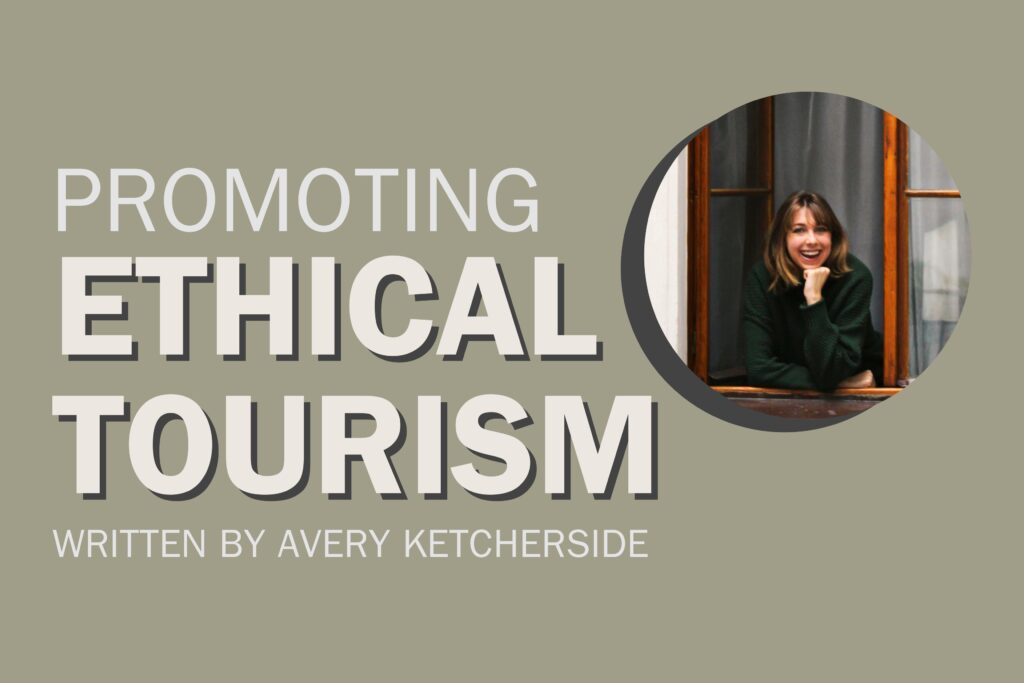Promoting Ethical Tourism

It’s time to hang up the fanny pack, lose the socks with sandals, and reframe the way we think about tourism. The pandemic revealed the tourism industry’s complicated influence on economic and environmental affairs. Globally, greenhouse gas emissions and air pollution dropped, and many popular destinations saw the restoration of ecological systems; however, we are still studying the economic impact covid-19 had on tourism. The World Travel and Tourism Council’s Global Economic Impact and Trends 2021 report states that the travel and tourism sector suffered losses of almost 4.5 trillion USD due to travel restrictions. These revelations are convincing travelers to look for ethical travel experiences post-covid.
According to one travel site’s Sustainable Travel Report 2022, 71% of global travelers want to travel more sustainably and 81% state that sustainable travel is important to them. Approximately a third of those surveyed are wanting to have a locally relevant experience, with 45% expressing that preserving and learning from cultures is part of sustainable travel. However, global travelers need direction when making sustainable travel decisions. Of those surveyed, 34% said they don’t know how or where to find ethical activities and tours, and 32% want travel companies to suggest sustainable travel options when booking trips. PR professionals that work in travel and tourism capacities should note this shift in eco-friendly and ethically-conscious travel for their company’s campaigns and strategies.
PR professionals can promote sustainable travel through various facets. As most travelers book trips online, it’s vital to have a steady flow of content and a strong presence on social media. Engaging posts and blogs can showcase what sustainable travel looks like from eco-friendly accommodations to personable connections with locals. It’s important for campaigns to accurately express the culture, cuisines, and people of its targeted location. This will make the message more authentic and build brand credibility. Travel and tourism PR can also influence tourists to venture outside of attractions facing over-tourism. Not only does this tactic fuel economic and social opportunities for locals in different areas, but tourists also can experience a locally relevant trip.
Furthermore, integration is important for travel and tourism public relations success. PR professionals should work with marketing and management teams — as well as local governments and travel boards — to maximize promotional and sustainability opportunities. Cross-collaborating with iconic brands or restaurants of the desired destination, airlines committed to cleaner travel, or eco-conscious hotels and rental stays encourages tourists to consider sustainable travel. These collaborations reflect the campaign’s relevancy and bolsters brand credibility.
Agencies have the unique opportunity to strengthen global relations by promoting sustainable travel. Adrienne Lee, Director of Development at the Planterra Foundation, states in a Lonely Planet article, “Responsible travel operators are crucial in connecting travelers to business owners that are creating opportunities for many at the grassroots level.” Equipping clients with knowledge of sustainable travel options such as eco-friendly properties or accommodations, carbon-conscious transport, and ethical ways to experience and give back to the host community reflects an agency’s innovative attitude towards the future of travel. By fostering mutually beneficial relationships between travelers and local tourism, agencies protect the sovereignty of communities and the viability of the industry.

Avery Ketcherside is a senior at Samford University studying journalism with a double concentration in print and public relations, as well as a minor in geography. She aspires to create content for the travel, tourism, and entertainment industries.
